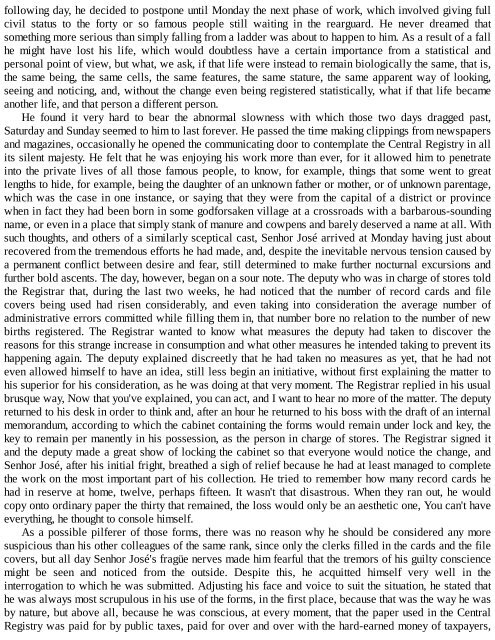You also want an ePaper? Increase the reach of your titles
YUMPU automatically turns print PDFs into web optimized ePapers that Google loves.
following day, he decided to postpone until Monday the next phase of work, which involved giving full<br />
civil status to the forty or so famous people still waiting in the rearguard. He never dreamed that<br />
something more serious than simply falling from a ladder was about to happen to him. As a result of a fall<br />
he might have lost his life, which would doubtless have a certain importance from a statistical and<br />
personal point of view, but what, we ask, if that life were instead to remain biologically the same, that is,<br />
the same being, the same cells, the same features, the same stature, the same apparent way of looking,<br />
seeing and noticing, and, without the change even being registered statistically, what if that life became<br />
another life, and that person a different person.<br />
He found it very hard to bear the abnormal slowness with which those two days dragged past,<br />
Saturday and Sunday seemed to him to last forever. He passed the time making clippings from newspapers<br />
and magazines, occasionally he opened the communicating door to contemplate the Central Registry in all<br />
its silent majesty. He felt that he was enjoying his work more than ever, for it allowed him to penetrate<br />
into the private lives of all those famous people, to know, for example, things that some went to great<br />
lengths to hide, for example, being the daughter of an unknown father or mother, or of unknown parentage,<br />
which was the case in one instance, or saying that they were from the capital of a district or province<br />
when in fact they had been born in some godforsaken village at a crossroads with a barbarous-sounding<br />
name, or even in a place that simply stank of manure and cowpens and barely deserved a name at all. With<br />
such thoughts, and others of a similarly sceptical cast, Senhor José arrived at Monday having just about<br />
recovered from the tremendous efforts he had made, and, despite the inevitable nervous tension caused by<br />
a permanent conflict between desire and fear, still determined to make further nocturnal excursions and<br />
further bold ascents. <strong>The</strong> day, however, began on a sour note. <strong>The</strong> deputy who was in charge of stores told<br />
the Registrar that, during the last two weeks, he had noticed that the number of record cards and file<br />
covers being used had risen considerably, and even taking into consideration the average number of<br />
administrative errors committed while filling them in, that number bore no relation to the number of new<br />
births registered. <strong>The</strong> Registrar wanted to know what measures the deputy had taken to discover the<br />
reasons for this strange increase in consumption and what other measures he intended taking to prevent its<br />
happening again. <strong>The</strong> deputy explained discreetly that he had taken no measures as yet, that he had not<br />
even allowed himself to have an idea, still less begin an initiative, without first explaining the matter to<br />
his superior for his consideration, as he was doing at that very moment. <strong>The</strong> Registrar replied in his usual<br />
brusque way, Now that you've explained, you can act, and I want to hear no more of the matter. <strong>The</strong> deputy<br />
returned to his desk in order to think and, after an hour he returned to his boss with the draft of an internal<br />
memorandum, according to which the cabinet containing the forms would remain under lock and key, the<br />
key to remain per manently in his possession, as the person in charge of stores. <strong>The</strong> Registrar signed it<br />
and the deputy made a great show of locking the cabinet so that everyone would notice the change, and<br />
Senhor José, after his initial fright, breathed a sigh of relief because he had at least managed to complete<br />
the work on the most important part of his collection. He tried to remember how many record cards he<br />
had in reserve at home, twelve, perhaps fifteen. It wasn't that disastrous. When they ran out, he would<br />
copy onto ordinary paper the thirty that remained, the loss would only be an aesthetic one, You can't have<br />
everything, he thought to console himself.<br />
As a possible pilferer of those forms, there was no reason why he should be considered any more<br />
suspicious than his other colleagues of the same rank, since only the clerks filled in the cards and the file<br />
covers, but all day Senhor José's fragüe nerves made him fearful that the tremors of his guilty conscience<br />
might be seen and noticed from the outside. Despite this, he acquitted himself very well in the<br />
interrogation to which he was submitted. Adjusting his face and voice to suit the situation, he stated that<br />
he was always most scrupulous in his use of the forms, in the first place, because that was the way he was<br />
by nature, but above all, because he was conscious, at every moment, that the paper used in the Central<br />
Registry was paid for by public taxes, paid for over and over with the hard-earned money of taxpayers,



